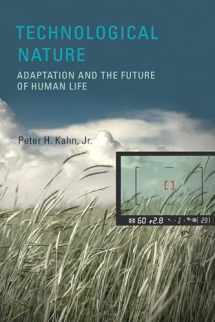
Technological Nature: Adaptation and the Future of Human Life
Book details
Summary
Description
Why it matters that our relationship with nature is increasingly mediated and augmented by technology.
Our forebears may have had a close connection with the natural world, but increasingly we experience technological nature. Children come of age watching digital nature programs on television. They inhabit virtual lands in digital games. And they play with robotic animals, purchased at big box stores. Until a few years ago, hunters could "telehunt"―shoot and kill animals in Texas from a computer anywhere in the world via a Web interface. Does it matter that much of our experience with nature is mediated and augmented by technology? In Technological Nature, Peter Kahn argues that it does, and shows how it affects our well-being.
Kahn describes his investigations of children's and adults' experiences of cutting-edge technological nature. He and his team installed "technological nature windows" (50-inch plasma screens showing high-definition broadcasts of real-time local nature views) in inside offices on his university campus and assessed the physiological and psychological effects on viewers. He studied children's and adults' relationships with the robotic dog AIBO (including possible benefits for children with autism). And he studied online "telegardening" (a pastoral alternative to "telehunting").
Kahn's studies show that in terms of human well-being technological nature is better than no nature, but not as good as actual nature. We should develop and use technological nature as a bonus on life, not as its substitute, and re-envision what is beautiful and fulfilling and often wild in essence in our relationship with the natural world.


We would LOVE it if you could help us and other readers by reviewing the book
Book review



